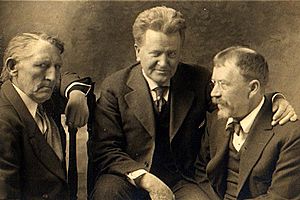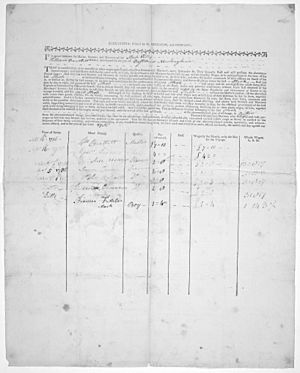Shanghaiing facts for kids
Shanghaiing was a tricky and often forceful way of making people become sailors on ships. Imagine being tricked or even kidnapped and then waking up on a ship, forced to work! The people who did this were called crimps. A similar practice, called press gang, was used by the British Royal Navy to force men into their service.
Contents
Where the Word "Shanghai" Came From
The word "shanghai" started being used in the 1850s, around the same time as "crimping." It probably came from the city of Shanghai in China, because many ships with kidnapped crews were headed there. Today, the word "shanghai" can mean to kidnap someone or to trick them into doing something they don't want to do.
Why Shanghaiing Happened
Shanghaiing was a big problem in port cities. Places like London and Liverpool in England, and San Francisco, Portland, and New York City in the United States, were known for it. Portland even became more famous for shanghaiing than San Francisco!
Several things made shanghaiing possible:
- Old Laws: In the past, if an American sailor signed up for a voyage, it was illegal for them to leave the ship before the trip ended. If they tried, they could go to jail. This law made it easy for crimps to keep people on ships.
- Not Enough Sailors: During the California Gold Rush, many sailors left their ships to search for gold. This meant ships needed new crews quickly. A healthy person, even if unwilling, was very valuable to ship captains.
- "Boarding Masters" and "Crimps": People called "boarding masters" found crews for ships. They were paid for each person they put on a ship. This payment was sometimes called "blood money." This encouraged them to find as many sailors as possible, even if it meant using tricks or force.
The easiest way for a crimp to shanghai someone was to make them unconscious, fake their signature on the ship's papers, and then collect their "blood money." But crimps found even more ways to make money. They could get the first few months of a sailor's wages. They would also sell clothes and equipment to the sailors at very high prices, and then collect that money directly from the ship's captain. Some crimps made a lot of money, like $9,500 in 1890, which would be worth much more today!
Crimps were also good at politics. They would get people to vote many times for politicians who would protect their business. In San Francisco, some crimps like Joseph "Frenchy" Franklin and George Lewis even became state lawmakers. This helped them make sure no laws were passed that would hurt their shanghaiing business.
Some famous crimps included Jim "Shanghai" Kelly and Johnny "Shanghai Chicken" Devine from San Francisco, and Joseph "Bunko" Kelly from Portland. There are many stories about how ruthless they were. One story tells of "Shanghai" Kelly throwing a fake birthday party to trick enough people into joining a ship called the Reefer and two other ships.
How Shanghaiing Ended

Even in the early 1900s, shanghaiing was still a danger, especially with ships heading to Alaska and the Klondike for gold. But over almost 50 years, new laws slowly put an end to the practice.
- In 1868, New York State started to control the boardinghouses where sailors stayed. Their numbers dropped a lot.
- In 1871, a law was passed that allowed officers who mistreated sailors to lose their licenses.
- In 1872, the Shipping Commissioners Act of 1872 was passed. This law said that a sailor had to sign up for a ship in front of a federal shipping commissioner. This was meant to make sure no one was forced onto a ship without knowing it.
- In 1884, the Dingley Act tried to stop sailors from getting money in advance for their wages. It also limited who sailors could send their wages to, usually only close family. However, crimps found ways around this law.
The invention of steam-powered ships also helped end shanghaiing. These ships didn't need as many sailors to handle sails, so the demand for unskilled labor went down. The sinking of the RMS Titanic in 1912 and the start of World War I (which made sea travel very dangerous) also pushed for changes. Finally, in 1915, Andrew Furuseth and Senator Robert M. La Follette helped pass the Seamen's Act of 1915. This law made crimping a federal crime and finally stopped the practice.
Famous Crimps
- Maxwell Levy, known as Port Townsend's Crimper King
- James "Shanghai" Kelly from San Francisco
- Johnny "Shanghai Chicken" Devine from San Francisco
- Joseph "Bunko" Kelly from Portland
- "One-Eyed" Curtin
- "Horseshoe" Brown
- Dorothy Paupitz from San Francisco
- Andy "Shanghai Canuck" Maloney from Vancouver
- Anna Gomes from San Francisco
- Thomas Chandler
- James Laflin
- Chris "Blind Boss" Buckley, a powerful politician in San Francisco in the 1880s
- William T. Higgins, another powerful politician in San Francisco in the 1870s and 1880s
- "Shanghai Joe" from New Bedford, Massachusetts
- Tom Codd, the Shanghai Prince from New Bedford, Massachusetts
- James Turk from Portland
- Tommy Moore from Buenos Aires
See also
 In Spanish: Crimpado (engaño) para niños
In Spanish: Crimpado (engaño) para niños
 | William M. Jackson |
 | Juan E. Gilbert |
 | Neil deGrasse Tyson |


